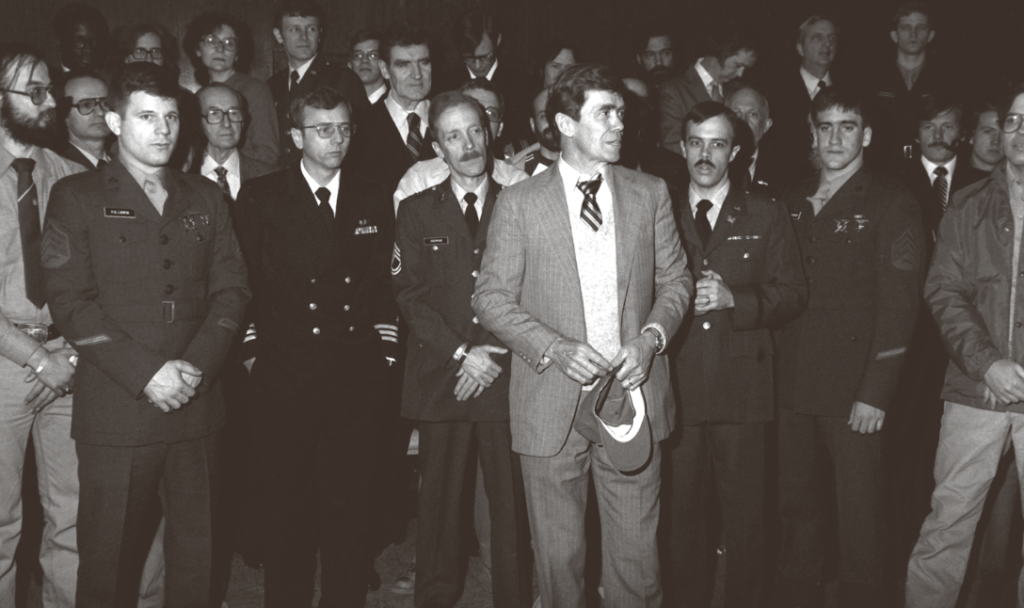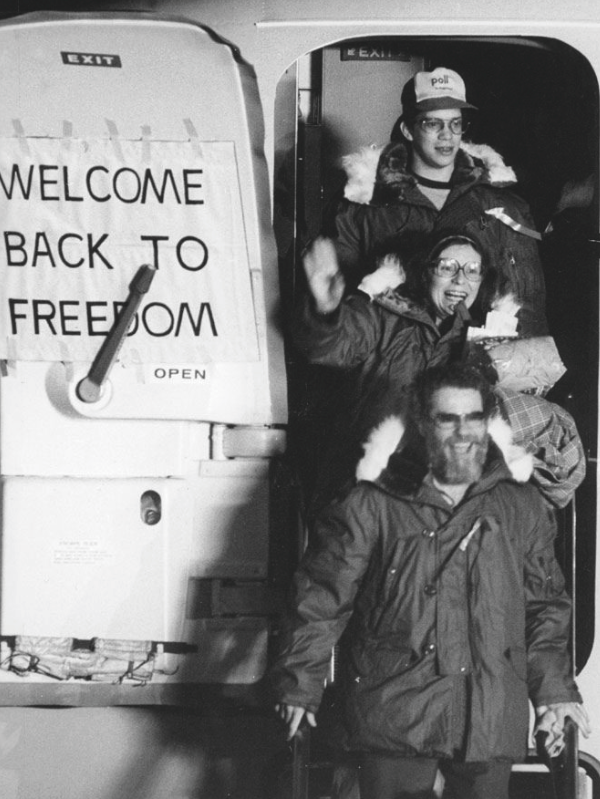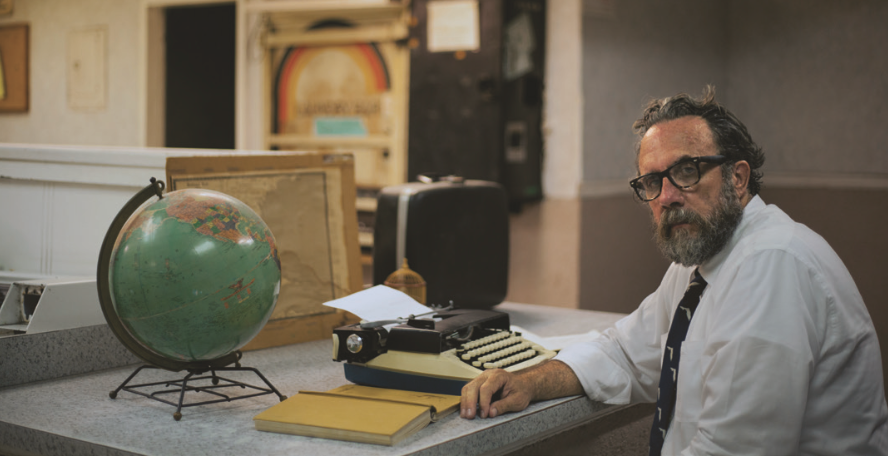We sat in the back of a deuce and a half (two-and-a-half-ton truck), dressed for battle—M-16s, M-60s, hand grenades, and other weapons were loaded up. It was full alert. In a few weeks, I was scheduled to get my discharge from active duty. My Army contract stipulated that I had three more years of inactive duty, which meant they could keep me if they needed me, like during wartime. I didn’t take that very seriously until we went on full alert.
In a few weeks, the impetus for the alert, the Iran Hostage crisis, would be over. The last 52 hostages would be set free. They were released on Reagan’s inauguration day, January 20, 1981. I’ve heard many people credit Reagan with their release even though he wasn’t even president when the release was negotiated. In some circles, the narrative that Reagan was responsible for the release has become a part of the Reagan myth, and it makes Carter, who was president at the time, look weak.

photo by Johnson Babela
January 20, 1981 was also the day that I was released from the tyranny of the military.
I’m not sure how long our alert status lasted. It seemed like a week or so. Many of us waited in between breaks of smoking hash. Hash was ubiquitous in the military in Germany at the time. I was telling my friend David about my experiences in Ludwigsburg, dealing hash, selling black market cigarettes and whisky. He said I should watch Buffalo Soldier with Joaquin Phoenix, because it sounded like a similar experience. I did watch it. I think it failed to capture the humor, but it captured some of the detached behavior. I was never so pissed off at humanity in my life as I was in the Army, but I also laughed a lot. I made a trip to rehab, for alcohol. For the first one, I poured a beer on a lieutenant’s black dress shoes while he was wearing them. I said I didn’t really remember the incident—that helped me avoid a court martial, the alcohol made me less accountable.
I liked to get high. I continued that pace briefly after my release, but since then I’ve lived a pretty clean life. I just got tired of the lifestyle, the stupid conversations, and failed to see the romantic elements of that kind of life. It didn’t take rehab for me. The Army rehab experience might have had an impact because I didn’t want any problems with the Army. I ended up leaving as a Specialist 4, and was asked to stay and be an acting sergeant. Most us were asked to stay.
Being on alert waiting, and maybe going to war, I always thought of myself as a pacifist, but at 22, high on drugs, just waiting for any new episode in life, I thought maybe I needed to go to war as a rite of passage. Even then, I was aware of how self-absorbed that sounded. There is no way that I can really place myself in that reality vicariously. I wanted to write a novel; I thought I had to experience everything. If I had gone to battle, I may have run. I really have no idea what I would do.

U.S. hostages arrive at Rhein-Main U.S. Air Force base in Frankfurt, Germany
I was in a military intelligence unit. We did have a few bright lights of humanity. Most of them were regularly disciplined. There was one guy, William, who was a little older, around 25. He had been a high school English teacher. He joined because he couldn’t figure out the next step in life. He had a huge book collection, and more books were constantly coming to him in the mail. He was the professor to a few of us, from the San Francisco area. He directed me to several transgressive writers. I guess that fit. I remember reading a Henry Miller book, I think it was Tropic of Cancer. I came across the word “Weltschmerz.” I thought that it was interesting that a German word was in his story, and then I realized the word is also in the English dictionary. It translates into world pain: Welt-‘world’ and Schmerz-‘pain, suffering.’ When a local would come up to me and ask, “Wie gietz?” (“How are you?”), I would respond, “Ich habe weltschmerz” (“I have world pain”). It was a great ice-breaker.
I thought I might see the hostages at the airport in Frankfurt. They were transiting through Germany. I didn’t see them.
I can’t remember exactly where the bus ride started, but we were headed for Ft. Jackson near Columbia, SC, to finish processing out of the Army. I hadn’t been in the states in over two years—billboards everywhere, everything looked ugly to me. I wanted to go back to Europe. My family and friends met me at the airport in Orlando. I was happy to see them. My brother said, “The 53rd hostage is home.” I remember being terrified that Reagan was going to be be very hawkish. His activity turned out to be mostly covert interventions. I wasn’t asked to return.
I never anticipated a time where there checks and balances would be almost irrelevant. Reagan was considered to be uninformed by many educated people. Gil Scott-Heron wrote the song “B Movie” about Reagan’s America. Many of us feared being led by an actor. Many of us remembered this avuncular-seeming guy as the guy who sent the National Guard into Berkeley to deal with student protestors by any means necessary.
The bar is much lower now, and Reagan seems like an intellectual compared to Trump. He was also much more rational compared to Trump. I just watched All the President’s Men again: the film starring Dustin Hoffman and Robert Redford about the Washington Post reporters who, through investigative journalism, found enough evidence against the Nixon administration to eventually end his presidency and have several others arrested. There might be several parallels today with Trump’s administration, but the illogic of today’s America makes me wonder if evidence really means anything.
A few years ago I watched the critically acclaimed Carol Reed film, The Third Man. Many people who know film use the film as the standard, or at least consider it one of the best. I’ve always been bothered by the Joseph Cotten character. He was a cocky young American. He reminded me of those travelers that I met along the way who acted worldly, but were incredibly naïve about the world. Cotten’s character was the classic homespun, salt of the earth type. To me, he was a man who knew nothing outside of his own world and didn’t seem understand that he wasn’t in Kansas (or wherever he was from) anymore. He was just a character in a film, but I have met plenty of these types during my travels. He is one of those Americans who make me cringe. Now, these people are in charge. They can bomb Syria, Afghanistan, and who-knows-where next.

photo by Ashley Inguanta
I heard a pundit discussing how Trump is running our country like a business, and threatening countries that disagree with him, or embarrass him. This is why I brought Joseph Cotten’s character up: he was a brash, know-nothing whose actions may have threatened himself and others, but now we have that type of character running our country. The character running our country is much more maladjusted and dangerous. He has been nurtured by a culture that rewards bad behavior as long as that person has power and money. He has been nurtured by a culture that considers a person who has made a lot of money a success, and disregards any substance. It is a culture that doesn’t seem to have a collective understanding of what represents strength and what represents weakness. It is a culture with so many positives, but we need to stop rewarding those who are taking—I’m referring to the wealthy bullies.
There have been suggestions by politicians, mostly Republicans, that any person who receives government aid should have to be tested for drugs. How about we start with the politicians like Mitch McConnell who are making around two-hundred grand a year, not counting expense accounts? He’s freeloading off of the government in a big way. Test him. He appears to be working for the NRA, Koch brothers and other groups who are bringing humanity down. Meanwhile, educators, scientists, and other educated people who are working towards positive change are not treated with respect. They have been reduced to “elitists” by the worst students. It’s not only idiotic, it’s also scary. We are the only educated country where the climate change discussion is controversial. This is bullshit. We need to quit acquiescing to dangerous ignorance. When I hear people like Rick Scott discredit a liberal arts degree or, when I hear that Trump, Scott, and others want to take away funding from the arts, science, and Planned Parenthood, we need to fight them on their ignorance. It is not acceptable. Maybe these people don’t want critical thinkers, because critical thinkers are going to question them.
I feel powerless in many ways, but I also know that I can do something about some of that. We need pester the hell out of these people who are somehow in charge. We need to vote and make noise everywhere. We need to protest. We also really need a heavy dose of introspection. Being self-critical is necessary if it is constructive, and results in positive changes, not just reactions. Being obsessed with being “number one” does not show any wisdom on our part. I hope we can figure this out without too much damage to ourselves or to anyone else.
